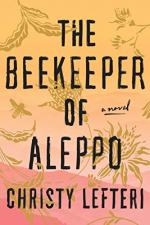|
This section contains 651 words (approx. 2 pages at 400 words per page) |

|
The Beekeeper of Aleppo Summary & Study Guide Description
The Beekeeper of Aleppo Summary & Study Guide includes comprehensive information and analysis to help you understand the book. This study guide contains the following sections:
This detailed literature summary also contains Quotes and a Free Quiz on The Beekeeper of Aleppo by Christy Lefteri.
The following version of this book was used to create this study guide: Lefteri, Christy. The Beekeeper of Aleppo. New York: Ballantine Books, 2019.
The novel’s narrator and protagonist is Niri Ibrahim, a man from Syria. He and his wife Afra have fled from Syria due to the violence of the Syrian Civil War. After a long journey, they have managed to reach London, England. They are living in a lodging house with other refugees, as they wait to learn whether or not they will be granted asylum.
The novel’s main storyline focuses on Nuri and Afra’s journey, which is told in a series of flashbacks. They lived a peaceful life in the Syrian city of Aleppo. They had a seven-year-old son named Sami. Nuri worked as a beekeeper, which he found very fulfilling. His partner and mentor in this business was his cousin Mustafa. After violence of the war began to spread and to affect Aleppo, Mustafa sent his wife and daughter out of the country. Later, when Mustafa’s son was killed by crossfire from the war, Mustafa decided to flee the country as well.
One day, Nuri’s son Sami was struck and killed by the explosion of a bomb. Afra witnessed Sami’s death, and the trauma caused her to go blind. Afra then felt suicidal, but Nuri persuaded her to leave to country with him. They planned to try to travel to England, which was the destination of Mustafa and his family. Nuri and Afra hired a smuggler to take them out of Syria. They managed to avoid various dangers and arrive in Turkey. There, among a group of refugees, Nuri met a Syrian orphan boy named Mohammed, who was about the same age as Sami. Nuri soon grew protective of Mohammed, and they became like surrogate family members to each other.
The refugees crossed the Mediterranean Sea in a boat. The journey was perilous, but they managed to compete it without any deaths. They arrived on a Greek island where refugees were being taken in and processed. Soon, Nuri lost track of Mohammed. Nuri searched for Mohammed for a month before deciding that he and Afra needed to move on. Nuri left behind money and instructions for Mohammed. Later, with Afra’s help, Nuri realized that Mohammed never actually exist, but was a figment of Nuri’s traumatized mind.
Nuri and Afra then rode on a boat to Athens, where they were placed in a refugee camp. It soon became apparent that the camp was not a safe place. Nuri met a Somali woman in the camp whose baby was stolen from her after she arrived there. In the camp, there was an Afghan man named Nadim who was attacking and/or raping other refugees. At one point, an angry mob attacked Nadim, and Nuri felt compelled to join. Nadim died, and Nuri felt plagued by guilt for helping to kill someone.
Nuri eventually a managed to find a smuggler who would help Nuri and Afra escape to England. The smuggler forged passports and arranged plane tickets for them. One day, the smuggler raped Afra. Nuri resisted the urge to retaliate, as they still needed the smuggler’s help. With the forged passports, Nuri and Afra managed to successfully travel to England, where they applied for asylum.
At the end of the novel, Nuri and Afra reunited with Mustafa and his family. Nuri and Afra have not yet been granted asylum, but they remain hopeful. They also hope that they will be able to return to a peaceful Syria someday.
The author then includes a brief note about her inspiration for the book. She worked as a volunteer in refugee camps in Athens, and she heard personal stories from many refugees. The author urges for the improvement of services for refugees and for further compassion in the international community.
Read more from the Study Guide
|
This section contains 651 words (approx. 2 pages at 400 words per page) |

|



